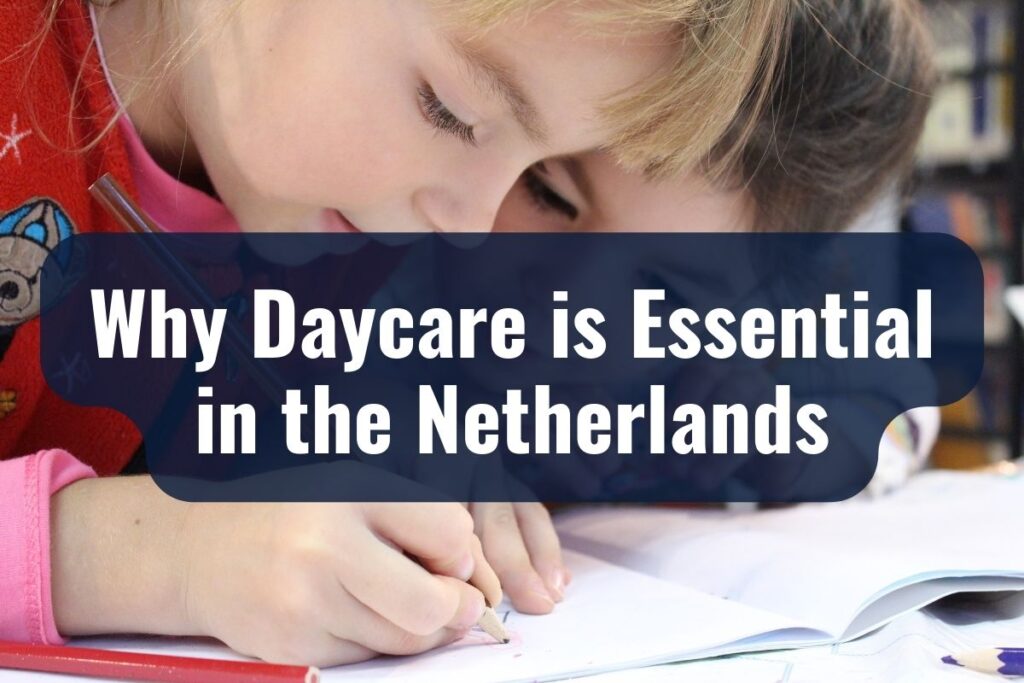Moving to a new country is an adventure filled with countless challenges and unique experiences. For expat families in the Netherlands, navigating the ins and outs of the Dutch daycare system can feel like decoding an intricate puzzle, especially if you’re still familiarizing yourself with the language.
We understand the importance of finding the right environment for your child, one where they’ll thrive, learn, and interact with their peers. That’s why this guide seeks to provide a clear, empathetic, and comprehensive overview of daycare in the Netherlands.
Key Takeaways:
- The Netherlands offers diverse daycare options to cater to varied needs.
- Government support, like “kinderopvangtoeslag”, makes childcare more financially accessible.
- Personal visits and understanding cultural nuances play a crucial role in selecting the right daycare.
- Transitioning your child to daycare requires patience, reassurance, and open communication.
Why Daycare is Essential in the Netherlands

The decision to enroll your child in daycare is a deeply personal one, influenced by a myriad of factors ranging from family values to work schedules. But in the context of the Netherlands, with its unique culture, educational systems, and social dynamics, there are some compelling reasons to consider daycare as a valuable step in your child’s journey.
Daycare centers in the Netherlands are not just spaces for children to be looked after while parents work; they’re nurturing environments that prioritize holistic child development. Your child will get the chance to engage in various stimulating activities, from arts and crafts to outdoor explorations, fostering their creativity, motor skills, and cognitive growth.
For expat families, a major concern often revolves around language. Dutch daycares offer a natural setting for your child to be immersed in the Dutch language, facilitating their linguistic fluency. But more than just language, it’s about cultural immersion, too, helping your child understand and integrate into their new environment. And fear not, many daycare centers are used to catering to non-Dutch speakers and will ensure your child feels included and supported.
he Dutch education system has its unique characteristics, and early exposure through daycare can ease your child’s transition to formal schooling. They’ll become accustomed to routines, social interactions, and the general ebb and flow of a classroom-like setting.
Children are inherently social beings. Dutch daycares emphasize group activities, fostering teamwork, sharing, empathy, and communication skills. It’s also a chance for your child to form their first friendships, bonds that often last well into their school years.
The Netherlands boasts a strong work culture, and for many expat families, both parents might be engaged in full-time employment. Reliable daycare facilities offer the peace of mind that your child is in a safe, enriching environment, allowing you to focus on your professional commitments without constant worry.
Types of Daycare in the Netherlands
As you embark on this journey of finding the ideal daycare setting for your child in the Netherlands, understanding the different types available is crucial. Each option has its unique features, catering to various needs and preferences. We know that every child is unique, and every family has distinct requirements, so here’s a warm, comprehensive guide to help you navigate the choices:
| Type of Daycare | Description | Ideal For |
| Kinderdagverblijf | Daycare centers offering full-day care, usually for kids up to 4 years old. | Working parents needing full-day care. |
| Gastouderopvang | Care given by registered individuals in their homes, allowing for a homely environment. | Parents seeking a more intimate setting. |
| Peuterspeelzaal | Playgroups focused on structured play and socialization, typically half-day sessions. | Preschoolers needing social interaction. |
| Buitenschoolse opvang | After-school care centers for school-going children, providing activities and care till parents pick up. | School-aged kids with working parents. |
Kinderdagverblijf (Child Daycare Centers)
- Age Group: Primarily for children aged 0-4.
- Environment: These are organized, structured settings, often with a larger number of children grouped by age.
- Activities: A blend of play and structured learning. Think painting sessions, storytimes, and interactive games.
- Considerations: Ideal for parents looking for regular, consistent care during workdays. They often operate on set schedules, aligning with standard working hours.
Gastouderopvang (Host Parent Care)
- Age Group: Broad range, often catering from infants to school-going children.
- Environment: A more intimate setting, usually in the carer’s home or the child’s home. It feels more like a family atmosphere with fewer children.
- Activities: Activities can be more tailored to individual children, given the smaller group size. Expect a blend of play, relaxation, and some structured activities.
- Considerations: If you’re looking for a more personalized touch, with a home-like feel, this might be your go-to. It’s also flexible, catering to varied parent schedules.
Peuterspeelzaal (Playgroups)
- Age Group: Specifically designed for toddlers, generally ages 2-4.
- Environment: Group setting, but with a focus on play and socialization rather than structured learning.
- Activities: Lots of interactive play, outdoor time, and group activities to help toddlers develop social skills.
- Considerations: Great for introducing your toddler to a group setting without the long hours of a full daycare. It helps with the transition to school, teaching them to engage with peers.
Buitenschoolse opvang (Out-of-school care)
- Age Group: Designed for school-going children up to age 12.
- Environment: A bridge between school and home. More relaxed than a school environment, but structured enough to keep children engaged.
- Activities: Varied activities from crafts to sports and even homework help. It aligns with children’s interests and school curricula.
- Considerations: Perfect for parents who work longer than school hours. Children are cared for in a stimulating environment until parents can pick them up.
Cost and Financial Assistance

The Netherlands, with its picturesque canals and windmills, also brings with it the practical considerations of daily life, one of which is the cost of daycare.
The cost of daycare in the Netherlands can vary based on several factors such as location (urban vs. rural), type of daycare, and the services they offer.
Typically, Kinderdagverblijf (Child Daycare Centers) might have a higher fee than Gastouderopvang (Host Parent Care) due to the range of facilities and activities they offer.
It’s always wise to request a clear breakdown of costs when you visit or contact a daycare. This transparency ensures there are no unexpected surprises down the road.
Kinderopvangtoeslag – A Ray of Hope
One of the commendable aspects of the Dutch system is the “kinderopvangtoeslag“, which translates to childcare allowance. It’s a financial benefit the government provides to working parents to help mitigate childcare costs.
The amount you receive is dependent on several factors: your income, the number of children you have in care, and the type of care they’re receiving.
How to Apply for Kinderopvangtoeslag:
Firstly, ensure you are registered with the Dutch Tax Office (Belastingdienst). Use the online “kinderopvangtoeslag” calculator to get an estimate of what you might be eligible for.
Submit your application through the “Mijn toeslagen” section on the Tax Office’s website. Remember, applying within three months of your child starting daycare is essential to receive the allowance from that start date.
Additional Financial Support and Discounts
Some employers offer childcare vouchers or have partnerships with specific daycare centers, providing discounts for their employees.
Municipalities might have additional subsidies, especially for those attending Peuterspeelzaal (Playgroups). Always check with your local municipality for any specific schemes they might offer.
Considerations for Expats
It’s essential to note that to qualify for the “kinderopvangtoeslag”, both parents must be working, studying, or actively seeking employment.
Ensure all your documents, including work contracts and income details, are readily available when applying.
Related: Cost of Living in The Netherlands: A Complete 2023 Guide
Finding the Right Daycare: Tips and Considerations
Finding the right daycare is a journey, one that’s paved with care, patience, and a sprinkle of intuition. We’re here with a gentle guide, peppered with insights to help you make this crucial decision with confidence.
- Start Early:Popular daycare centers, especially in urban areas, tend to fill up quickly. The early bird truly gets the worm here. Start your search months ahead, ensuring you have plenty of options and aren’t making rushed decisions.
- Visit in Person:While online reviews and websites give a glimpse, there’s nothing quite like a personal visit. Walk the halls, observe the children, interact with the staff. Trust your gut feelings; they often indicate if a place feels ‘right’ or not.
- Ask About Language Support:If you’re concerned about the language barrier, inquire about English-speaking staff or how they support non-Dutch speaking children. Many centers have experience with expat children and have structures in place to ease their transition.
- Check Accreditations and References: Reliable daycare centers will have the necessary licenses and accreditations. It’s also beneficial to ask for references from other parents, especially those who might share your expat perspective.
- Flexibility and Accessibility: Life can be unpredictable, especially in a new country. Check if the daycare has flexible hours, emergency care options, or how they handle situations when you might be running late.
- Engage Your Child:If possible, visit the potential daycare with your child. Observe their reactions, their comfort level with the space, and the caregivers. After all, they’ll be spending significant time there, and their happiness is paramount.
- Open Communication Lines: Establish clear communication pathways with the daycare staff. Whether it’s about daily reports, addressing concerns, or discussing your child’s growth, open dialogue ensures a smoother experience for everyone involved.
- Safety and Hygiene: Ensure the daycare adheres to safety standards, whether it’s about secure premises, background checks for staff, or cleanliness. Peace of mind about your child’s safety is invaluable.
- Inclusive Environment: Look for daycares celebrating diversity, embracing children from various cultural backgrounds. It helps your child feel at home and introduces them to a rich tapestry of global traditions.
- Budget Considerations: While quality care is essential, it’s also crucial to find a daycare that aligns with your financial capabilities. Be upfront about your budget and ask about any hidden costs or additional charges.
Related: International Schools in The Netherlands (2023 Guide)
Settling Your Child into Daycare

Settling your child into daycare, especially in a new country, requires patience, understanding, and a lot of love.
Begin by talking to your child about the daycare. Paint it in positive light, emphasizing the fun activities they’ll partake in, the friends they’ll meet, and the joyous times awaiting them.
Pack their favorite toy or a comforting item from home to ease the initial anxiety. This little piece of familiarity can make a vast difference in unfamiliar surroundings.
Before the official start, consider doing a few short visits or ‘trial runs’ to the daycare. Let your child explore the environment, meet the caregivers, and even play for a bit. Gradual exposure can make the real deal less overwhelming.
Most daycares provide updates or have a system in place to inform parents about their child’s day. Stay connected, understanding their activities, moods, and any concerns that might arise.
It’s vital to recognize and validate your child’s feelings. If they express fear, sadness, or anxiety, address it with empathy, reassuring them while highlighting daycare’s positive aspects.
Children thrive on consistency. Keeping a stable routine, from morning preparations to bedtime stories, gives them a sense of security amidst the new changes.
Additional Resources
- ACCESS – A non-profit organization catering specifically to the expat community. They offer a range of services, including advice on childcare, and can guide you through many aspects of Dutch living.
These websites offer comprehensive listings of various childcare options available in different regions. You can filter based on your preferences, be it type, location, or language support.
- Belastingdienst – This is your go-to place for understanding and applying for “kinderopvangtoeslag”. They also provide detailed English guidelines to aid non-Dutch speakers.



